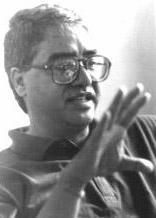
Deuba has been exonerated on one major graft charge. The regime just scored a major point. I mean, it was basically the Asian Development Bank's words versus some Monarchist puppets.
But it is a mystery he continues to be detained.
A second charge? If there is a Prime Minster Relief Fund, it is for the Prime Minister to decide where that money goes. It is discretion. And if the Prime Minister sends that money in all the wrong directions, that should be public knowledge, and the voters should punish the Prime Minister by throwing him or her out at the ballot box. Or if the very idea of the Fund is offensive, it should be gotten rid of by an act of the parliament. A Prime Minister who doled money out of a Prime Minster Relief Fund should not have to answer to an extra-constitutional body such as the RCCC. His case should have been taken up by the existing, constitutional CIAA with a govenment that was constitutional.
But, my bad. I misunderstood. He has been cleared of the charges to do with the Fund. So now it actually is the ADB's words versus that of the RCCC.
The RCCC's very formation is unwont. Its functioning even more so. The principle of separation of powers is routinely violated, the body has the powers of a court. Suspects are asked to speak against themselves and are punished when they don't. That violates another basic principle. It is to do with one not having to incriminate oneself.
The RCCC is power gone berserk. That is why the ideology of Monarchism stinks. It espouses unaccountable power.

I could write a few easy paragraphs criticizing Deuba. But that stays within the paradigm of democracy. No Deuba shortcoming is an argument against democracy.
On the other hand, I could say some positive things about him as well. But no praise puts him above the people. Let Deuba and the likes of him be subject to the ballot box.
Corruption is a valid issue, and the Congress as the party in power for most of the post-1990 period has to take some major responsibility, but the recourse is more democracy and rule of law. There is no other recourse.
Email From Arzu Rana Deuba
Gagan Thapa Arrested, Deuba Re-Arrested
In The News
- Former Nepal PM, six others cleared of graft charges Hindustan Times, India .... Deuba, detained since April-end, will continue to remain in detention till the agency pronounces a verdict on a second charge ... "The truth has finally prevailed. Justice has been done," said a triumphant Arju Deuba, wife of the leader ...... The entire country as well as international community has been closely watching the two cases ...... "Though it might not have been appropriate, it was a decision taken by the cabinet," commission officials said. "Collective cabinet decisions do not fall within Nepal's Corruption Act." ..... The charged ministers had defended themselves saying the cabinet had authorised the distribution of the money and cabinet decisions were above the law...... The Deuba cabinet had also authorised Nepalese Rs 12 million to the king's aunt, Princess Helen...... granting of extraordinary allowances by the present government to two of the deputy chairmen of the council of ministers....... attributed the commission's decision to "intense public pressure" .... charged with awarding a contract at inflated rates to a party member.
- Sacked Nepal PM cleared of graft charge
Reuters AlertNet - Sacked Nepal PM wins graft ruling
999 Today - Nepal former PM wins graft ruling
Journal of Turkish Weekly - Rebels Free 90 Students Abducted in Nepal Guardian Unlimited, UK Rebels typically hold abductees only for two or three days... the rebels have been abducting large groups of students in remote villages to teach them about their nine-year revolution.... About 250 students were taken from a nearby village on June 15 and sent back three days later.
- Rebels abduct 90 students from Nepal village
China Daily - 12 die in Nepal ambush News24, South Africa
- Security officers killed in Maoist clash
Radio Australia - 12 security personnel killed in Nepal violence Sify, India
- Maoists hurt 17 security personnel in Nepal:-
Webindia123 - US envoy to discuss Nepal crisis BBC News, UK
- Bihar Maoists have sneaked into Nepal: Indian police Kantipur Online, Nepal a red alert along Nepal-India border in Parsa-Rautahat area, after a group of about 50 heavily-armed Maoists sneaked into Nepal from Bairgania area..... were involved in last Thursday night’s daring raid on Madhuban .... ‘Operation Dhamaka’ .... The Maoists attacked their targets with precision and resistance.... one of the pamphlets recovered from the site read ‘Seize property of reactionary country, India, and distribute it to the poor’..... very well coordinated; and it was strikingly similar to the myriad of recent Maoist attacks on security installations in the northern neighbour..... the ‘compact revolutionary zone’ stretching up to Andhra Pradesh in South India.... Across India, 160 districts in 12 states are considered as Maoist affected, and intelligence officials say more new districts are being affected by the threat. The rise in Maoist activities is considered as India’s ‘No 1 national security threat’.
- Delhi junks Nepal link in strike
Calcutta Telegraph Senior intelligence officials in the capital have voiced doubts over the involvement of Maoists from Nepal in Thursday’s daylight attack on a small border hamlet ..... “Only a foolish leadership will get involved in joint raids with its counterparts across the border” ..... Maoists from Nepal continue to use the bordering states for shelter and treatment. - 2 killed as police, Naxals clash on Nepal border
Indian Express - A Refutation Of Harper's Article On The Maoits by Li Onesto INSN the May 2005 issue of Harper’s magazine .... contributes to a growing mountain of harmful disinformation..... in areas run by new revolutionary governments, they are radically changing the economic, political, and cultural life of millions of poor peasants .....a center set up only for “victims of Maoist torture” (no victims of the RNA) ...... Sweeping censorship and systematic disinformation by the Nepalese government have had a huge impact on people’s opinions and what they know and don’t know about the Maoists, not only internationally but within Nepal itself .... a journalist who left the Maoists, was imprisoned and tortured by the government and now writes for a Maoist newspaper..... the People’s Liberation Army is made up of tens of thousands of common peasants who are not “caught in the middle” but have joined the insurgency...... In Nepal over 85% of the people are peasants in the countryside, desperately poor, malnourished, and exploited by corrupt officials, landlords, and moneylenders. Lower castes and oppressed ethnic groups face systematic discrimination under a rigid caste system. Women are intensely suppressed and treated as inferior in every facet of society. A king controls the army and an oppressive monarchy is deeply embedded in the ruling structures of society. The whole country is subordinate to, dependent on, and dominated by India and imperialist countries like the U.S............. Nepal’s ruling class has not and cannot solve the basic problems of food, water, sanitation, and health care because this requires tearing up the existing economic, social, and political relationships within Nepalese society and between Nepal and other countries..... In areas they control real changes are taking place: redistribution of land, equal rights for women, end to the caste system, autonomy for oppressed ethnic groups, healthcare, education and the building of roads and bridges......... the composition of the PLA squads and platoons...... overwhelmingly made up of those on the very bottom of society—lower castes, ethnic minorities, peasant youth and many, many young women........ People like Griswold may talk about government repression, deep poverty, and powerlessness among the poor. But they don’t uphold the right of the people to really struggle against any of this..... Feudal traditions like arranged marriages, dowries, and polygamy ..... women’s bodies are owned, controlled, and bargained over in everything from marriage to sex trafficking...... the tyranny of local landlords, corrupt politicians, and moneylenders...... Extremely significant and liberating changes are taking place in the Maoist base areas..... in the Maoist areas caste distinctions have been abolished and intercaste marriages are common....... the Maoists have real support. ...... “The Maoists do not force anybody to fight. How can anyone force a man or woman to fire a gun? You need courage, dedication and spirit of sacrifice to become a fighter in the People’s Liberation Army. It’s not like playing video war games on a computer. It’s a life and death struggle. Only the most courageous men and women can prepare themselves to fight for revolution. There is a saying in Nepal that ‘a carried dog cannot hunt a deer.’” ....... How could the Maoists have achieved their current military and political strength without the genuine support and participation of thousands who believe in the goals of the revolution and on this basis are willing to go into battle and risk their lives? ........ video, photographs, and reports of massive Maoist rallies in the countryside ..... During the 2003 negotiations 30,000 people attended a Maoist rally in Kathmandu ...... the RNA has engaged in battles where they faced thousands of guerrilla fighters .... RNA soldiers and police captured by the Maoists have told reporters that while they had to listen to propaganda and were asked to join the revolution, they were not harmed. They were warned that if they were captured again, they would be severely punished, but they were given money and food so that they could go back to their village instead of returning to the RNA....... The vast majority of the 12,000 killed since the start of the war have been civilians murdered by the Royal Army, along with suspected revolutionaries also tortured and murdered...... Moriarty says, “It’s not Islamic fundamentalism, obviously. but it is a very fervent brand of Maoism that could cause great trouble in this area. They’ve said they’re going to invade the United States. I’m not too worried about that, but you ignore what they say at your own peril. You can’t pooh-pooh the Maoists and the threat that they represent.” ...... this little lie is part of a bigger lie—that the Maoists in Nepal are terrorists, so backing the regime in Nepal is part of the “war on terror.” ...... liberal Harper’s ...... we come to the conclusion: one side should be crushed—the Maoists......
- RCCC asked to take action against Giri, Bista NepalNews “Is it fair that Dr Giri take Rs 960,000 and Bista take Rs 1 million through a Cabinet decision?” Dahal asked
- Building peace amid violent conflict in Nepal by Kamala Sarup NepalNews ..... it’s time to invite the Maoists for peace talks ..... The Maoists' struggle may even spill over to Bhutan. .... The effects of the on-going violent conflict in Nepal have been enormous both in terms of economic loss and human suffering.
- Maoist raid in Bihar has Nepal stamp on it Newindpress, India "They could be wary of the fallout, perhaps why they don't want to admit to such an operation'' ..... Told to raise his hands, he was shot in the palms..... The attack on Madhuban was the first of its kind, attacking multiple targets in broad daylight. Usually, Naxals attack one target, that too under the cover of darkness.... Their planning had military precision, they started the offensive at 1.15 pm and ended it at 1.25 pm.... Bands of 20-25, many of them women, attacked each target while other groups cordoned off the town..... The Maoists were carrying wireless sets through which they were receiving orders from Mainuddin, their zonal commander who was killed in the encounter that followed.... "When our house was being attacked, one person stood outside the gate. When a pistol got jammed, a back-up team provided a new one. Some were ready with stretchers to carry away the wounded, others were only operating walkie-talkies''.... signs of increasing cooperation between Maoists on both sides

